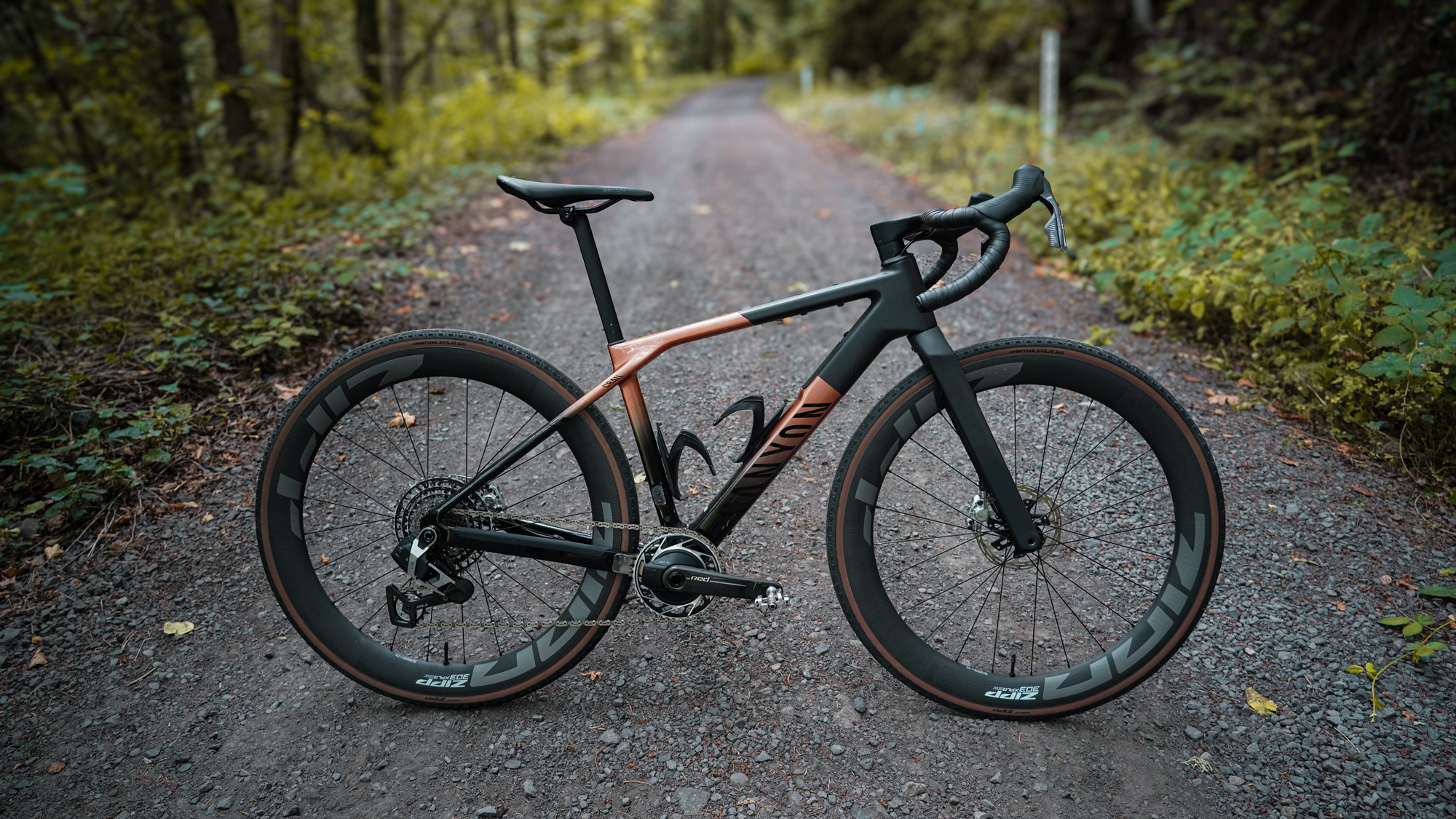Wider, deeper, faster: The all-new Zipp 303 XPLR SW gravel wheels reviewed
Sporting a 32mm internal width, the Zipp 303 XPLR SW is designed to be the fastest gravel wheelset ever, with an aerodynamic profile designed around a very specific tyre.

Zipp successfully achieved something unique with the Zipp 303 XPLR SW. They designed a wheel that’s light yet aerodynamic, stable but not dull, comfortable yet fast. They’re not outrageously expensive, either. Now, we just need more compatible tyres.
-
+
Speedy
-
+
Lightweight
-
+
Smooth ride feel
-
+
Offers Aerodynamic benefits
-
+
Easily replaceable J-bend spokes
-
-
Few tyre options for now
-
-
Some exposed carbon makes me wary of rim strike
You can trust Cycling Weekly.

Aero is everything. It’s a mantra that’s been used in road racing for many years, and gravel racing is catching up –if not surpassing the trend– fast. It started with aero bars (which are now largely banned) and has since made way for developments like skinsuits with built-in hydration bladders, wind tunnel-tested bike bags, aero chainrings and, as of late, specific wheel and tyre pairings designed around aerodynamics.
With riders now tackling 200–mile gravel courses in as little as 9 hours, speed is paramount, and small aerodynamic gains can have big impacts.
When the industry first got behind the gravel discipline, wheels and tyres were initially taken from the road discipline and modified for robustness. They had to be able to withstand the abuse of the rough terrain while aiding the prevention of punctures, which led to the blanket adoption of wider, tubeless tyres and rims. Aerodynamics initially took a backseat, and unlike in road racing, most wheels and tyres were developed independently of one another. However, the interaction between tyre profile and rim plays a crucial role in aerodynamics.
Consider any race-oriented road wheel, and you’ll notice how the external rim is ever so slightly wider than the tyre, creating a flush profile. In gravel racing, though, big tyres are the norm, with a 40mm being on the small side these days. But what happens when you put a 40mm tyre on a 25mm rim? You get the mushroom look - which, aesthetics aside, hampers aerodynamics and increases your chance of pinch flats.
Now, more brands and manufacturers are adopting a holistic approach to wheel and tyre design. Zipp calls it Total System Efficiency (TSE™), and with the newly released Zipp 303 XPLR SW gravel wheelset and Goodyear XPLR tyres, the brand hopes to offer proof of a concept many have been working toward: wider rim widths paired with wide tyres at lower pressures are not only more comfortable but also faster.
The wheelset and tyres were released alongside SRAM’s new flagship gravel drivetrain, the 13-speed SRAM Red XPLR AXS. I had a chance to ride it, and you can read the review here.
Introducing the Zipp 303 XLR SW gravel wheels:

The Zipp 303 XPLR SW gravel wheels sport a 32mm internal width
Zipp is certainly not unique in recognising the importance of how a tyre profile and rim interact when it comes to aerodynamics. Over the past few years, we’ve seen the internal rim width grow from 23 to 25 to 27 and even 30mm. There’s also been an increase in partnerships between wheel and tyre manufacturers (e.g., DT Swiss and Continental, Parcours and Panaracer) or wheel brands bringing their own tyres to market (e.g. Enve).
The latest race content, interviews, features, reviews and expert buying guides, direct to your inbox!
While Zipp has released its own tyres in the past, for its newest flagship product, the American company turned to tyre experts Goodyear to develop a perfect gravel tyre and then design a wheel around it.
The brand called their collaboration a “strategic partnership to develop industry-leading tyres that embrace emerging technologies and trends without compromise.”
Zipp’s resulting wheel sports one of the widest rims we’ve seen yet: 32mm internal.
Zipp argues that the mismatch of pairing a 38-50mm tyre with a standard rim size not only hampers aerodynamics, but the rim also does not provide enough support for lateral cornering loads at the desired lower pressures, causing the tyre to collapse and, therefore, negating any advantage.
The new wheelset and tyre pairing comes with a set of bold claims, including:
- Fastest gravel wheel around (on gravel)
- A 5-watt aerodynamic advantage over a leading competitor.
- Zipp says that on gravel surfaces, riders can lose up to 100 watts due to vibration. The larger-volume tyres at lower pressures are meant to act as a suspension to help smooth things out and help riders experience less muscle fatigue
- The 54mm deep rim creates the ’perfect aspect ratio for aerodynamic efficiency’ with a 40mm gravel tyre at race speeds.
In short, the Zipp 303 XPLR SW wheel was optimised for aerodynamics, comfort and flat protection, all intended to help gravel racers cover vast distances of rough terrain at speed.
Key features and details:

- 32mm internal width / max 40mm external width
- 54 mm rim depth
- Increased rim edge maximum protection from pinch flats
- Hookless and tubeless, designed for use with tyre pressures below 30psi (2.1 bars) / Max tyre pressure 50 psi/3.45 bar
- Rim dimensions conform to ISO 622x32 TSS standard but Zipp-recommended tyre sizes (40-60mm) fall outside of ISO recommendations Weight: 1,496 g with valves and tape ZR1 DB hub with 66 points of engagement
- Centre locking rotor interface. Aero optimised for a 40 mm tyre and minimal losses with 45 mm tyres XDR, SRAM/Shimano, Microspline, and Campagnolo N3W hub options
- Launching with Goodyear XPLR tyres but also compatible with select tyres from other brands
- Max System Weight 286lb / 130kg
- Price: $2,100 / €1,800 / £1.600.
The Goodyear XPLR tyres

The Goodyear XPLR 'slick' tyres
Designed with Zipp, the Goodyear XPLR tyres were made especially for –and only for– the 303 XPLR wheelsets. “Goodyear Designed for Zipp’ tyres are the result a collaborative approach to redefine performance at the highest level,” the brand states. They come in two models:
- A 40mm XPLR “Slick” which features a semi-slick pattern with two lines of side knobs and a minimally textured middle. The fastest of the two models, the Slick is a light and supple tyre intended for dry days and smoother surfaces. In other words: a champagne gravel tyre. Tyre weight 445grams

- The 45mm XPLR “Inter” was designed for dry and mixed conditions, with a tight pattern of knobs in the centre for fast rolling and side blocks for grip and cornering. These were made for races where the conditions may be a little more unpredictable, say at Unbound. They weigh 80 grams more than the Slick model, weighing in at 525 grams.

Goodyear XPLR "Inter" tyre
These tyre models are ONLY compatible with the Zipp 303 XPLR wheelsets. They’re tubeless but may be used with an innertube if necessary. Tyres retail for $80 / £80 each
The Ride

I got to test most of SRAM’s new top-tier collection all at once, as I received a Canyon Grail CFR test bike complete with the new SRAM Red XPLR AXS 13-speed groupset, Zipp 303 XPLR SW wheels and Goodyear XPLR Slick tyres. This build makes for a very lightweight yet capable and fast race machine – not unlike the bike the reigning gravel world champion Kasia Niewiadoma (Canyon-SRAM) is riding right now.
Looks are arbitrary, I know, but the wheels, with their deep dimpled rims, black spokes and matte grey branding, really do look great on this bike and would complement just about any modern gravel bike out there. They look and feel fast, and that alone gives a certain boost of confidence.
At 54mm, the rims are quite a bit deeper than most gravel wheels on the market, which tend to top out around 40mm. Still, with a weight of just below 1500 grams, the depth comes with little penalty.
In case you’re wondering how much of a difference 7 added millimetres of internal rim width makes to the naked eye, let me tell you: a lot. The wheels look absolutely beefy. They’re substantially wider than the rims on my XC bike and even bigger than the Reserve all-mountain hoops on my full-suspension mountain bike. But before you get tempted to throw these on your XC whip to set some new personal bests on your favourite trail, Zipp warns that these wheels are not to be used on mountain bikes. Any use outside of its intended riding application will void the warranty, and I’d imagine the lightweight build and sheer amount of exposed carbon were not made to withstand the impact.
The wide tyre bed on the 303 XPLR SW allows for a lower tyre pressure while maintaining speed on gravel roads. The wheel also has a lower max tyre pressure than most other rims on the market and depends on the tyre width. For example, tyres 40-44mm have a max tyre pressure of 51 PSI (3.5 bar), whereas super wide tyres measuring 55-64mm have a max tyre pressure of just 36 PSI (2.5 bar).
Since these wheels are unlike anything else currently on the market, Zipp suggests using its tyre pressure calculator in the AXS app. This tool takes your weight plus that of your bike and provides a suggested tyre pressure specifically for the 32mm inner rim width and intended terrain (i.e. gravel). In my case, it recommended 25 PSI (1.76 bar) for the front and 27 PSI (1.87 bar) for the rear. It’s not the ultra-low pressures you might see in cyclocross or mountain bike racing, but it’s still slightly lower than what I ran at my last two Unbound races.

When it was time to get out and ride the wheels, I’ll admit that I was a tad timid at first. I’m not one to shy away from the rougher end of the gravel spectrum, and some singletrack tends to wind its way into most of my local gravel routes. With the deep section rims and the visible rim edge peeking out from the sides of the 40mm tyres, there’s a lot of fragile carbon exposed to potential rim strikes, rocks, etc.
However, Zipp designed for this with 3.9mm-thick rim edges to keep the wheel intact in case of impact. Zipp says the rim edge is 77 percent thicker than previous models, decreasing the chance for damage should the tyre bottom out on the rim edge while also preventing pinch flats.
It’s important to reiterate that these wheels were specifically designed for speed and gravel racing and not technical off-road riding. And you actually can feel where the wheel is at its most efficient. Across chipseal and onto smooth gravel, the wheels zoom along happily, eating up the miles with ease and tangible speed. These wheels are made for those days when you can see vast, undulating hills stretch out before you, with winding ribbons of gravel roads disappearing into the horizon. On the wide open groads, you can really put the power down and let the wheels carry you across the plains, ticking off the miles in personal record time.
With the 303 XPLR SW wheel, Zipp has successfully found the rare combination of comfort and speed. And while made for gravel, these wheels would be a fantastic option for randonneurs and other long-distance road cyclists as well. Should you want to take these wheels on an off-road bikepacking trip, however, Zipp recommends using tyres wider than 58mm /2.28” and keeping the overall system weight below 286lb (130kg).
Aside from my fear of rim nicks and rim strike, the wheels performed surprisingly well on the twisty stuff, too. The hubs spin up quickly and the wheels have more liveliness to them than I would have expected from a 54mm deep rim. They’re stable yet easy to handle when you want to hit corners or attack the descent.
In long-term use, I’d imagine the wheels will be easy to live with as well, thanks to the serviceable hubs, external nipples and j-bend spokes (which are widely available).
A note about the Goodyear XPLR tyres

I got on very well with the 303 XPLR SW wheels but the Goodyear XPLR Slick tyre less so. It simply wasn’t the right fit for my riding and/or the time of year. “Slick” is a bit of a misnomer as the tyre does sport a pattern of two lines of small side knobs and a minimally textured middle. Even with the pattern, the tyre is very fast on both tarmac and smooth, hardpack gravel. But hardpack gravel was harder to find after a long and dry summer. The trails turned loose, dusty and rocky, and I found myself slipping on climbs and had to take corners with caution. I would have wanted either more width or more bite. So if you find yourself on similar terrain, perhaps the 45mm XPLR “Inter” tyre would be a better fit.
The Slick tyres are best reserved for the white roads of Italy, SBT GRVL’s champagne gravel or even Unbound on a mud-free year.
Value & Verdict

When it comes to the price tag, I honestly think Zipp set a very reasonable price. $2100 / £1600 is a lot of money, yes, but appropriate in a premium market. There aren't a lot of deep-rimmed aero gravel wheels on the market yet, and many would have priced their hero product much higher.
Looking at the pro gravel peloton, the Enve SES 3.4 wheels that Alexey Vermeulen uses, for example, are lighter but also shallower, less wide and retail for $2,850 / £3,100. The DT Swiss' GRC 1100 Dicut 50 wheels I've seen on Paige Onweller's race steed sport a 50mm deep rim, weigh 1575 grams and have a 24mm internal width. They also come with a $3,000 pricetag.
Perhaps the closest comparable product I've seen is Parcours' new FKT wheelset, which is also a deep-dish aero (47mm) gravel wheel with a wider internal rim (27mm versus Zipp's 32mm) and a similar weight of 1500 grams. The FKT wheelset does retail for less: $1,599.00 or $1899 with a ceramic bearing upgrade. Cycling Weekly is getting a wheelset in for review so stay tuned for that.
Final thoughts:
The Zipp 303 XPLR SW wheels are an impressive addition to the brand's top-tier offerings. Am I convinced that all wheels need a 32mm internal width going forward? I don’t know. Ask me again when the tyre market catches up. Right now, the lack of compatible tyres is a serious drawback.
That aside, Zipp successfully achieved something unique with the 303 XPLR SW wheels: they designed a wheel that’s light yet aerodynamic, stable but not dull, comfortable yet fast, and not outrageously expensive at $2100 retail.
If you’re an underbiker who enjoys technical and rugged terrain, these wheels are not for you. However, if you’re looking for speed across long and vast distances, the Zipp 303 XPLR SW wheels are certainly worth a look.

Cycling Weekly's North American Editor, Anne-Marije Rook is old school. She holds a degree in journalism and started out as a newspaper reporter — in print! She can even be seen bringing a pen and notepad to the press conference.
Originally from the Netherlands, she grew up a bike commuter and didn't find bike racing until her early twenties when living in Seattle, Washington. Strengthened by the many miles spent darting around Seattle's hilly streets on a steel single speed, Rook's progression in the sport was a quick one. As she competed at the elite level, her journalism career followed, and soon, she became a full-time cycling journalist. She's now been a journalist for two decades, including 12 years in cycling.